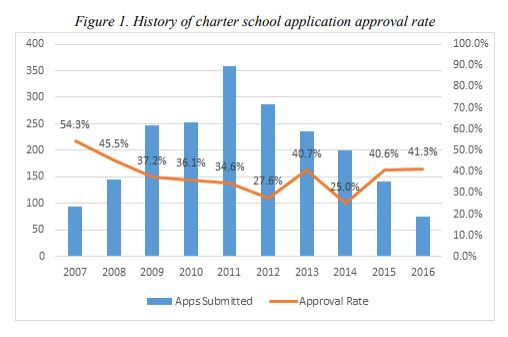
This summer, the Florida Board of Education overturned the Palm Beach School Board’s rejection of two charter school applications.
And this month the Florida Charter School Appeal Commission voted unanimously to support a new charter school whose application had been rejected by the Leon County School Board.
These recent conflicts speak to a broader trend in both Florida and the nation: Charter school approvals and applications are both dropping. Though student enrollment has continued to increase, reaching 295,814 in Florida, fewer new charter schools are being opened.
According to a new report from the National Association of Charter School Authorizers, school districts authorized 222 fewer new charter schools in 2016 than in 2013.
For the first time in five years, the national report also found that most new charters are approved by entities other than local school districts. The proportion of new charter schools authorized by non-district entities increased 15 percentage points to 59 percent in 2016, according to the report.
Statewide, the numbers tell a similar story. The latest Florida Department of Education Authorizer Report found that districts approved just 31 new charter schools in 2016-17 – down from 96 in 2013-14.
That drop is tied to three factors. First, applications have dramatically declined. The report found the state received only 75 charter school applications in 2016, which amounts to 161 fewer applications than in 2013. Second, the rate of approval remained at 41.3 percent, roughly the same as 2013, when nearly three times as many applications were filed. Third, 37 charter school applications were withdrawn for consideration before a local school board could decide.
Charter school advocates say when families become interested in varied educational options, the market can become saturated with many charter school options, resulting in a drop in applications. Advocates are also claiming charter school applications were rejected because some school boards implemented more stringent guidelines after the failure of some charter schools. Political tensions between the groups have also not helped matters.
“It has become more challenging,” said Bernardo Montero, president of Somerset Academy. Although he personally has reported the process has been seamless, he knows other administrators who are having more problems.
Montero said school board members could be wary of approving applications at the same rate they used to because it may create too much competition for the same students.
RedefinED reported in December 2017 the difficulties charter management organizations face in receiving approval from school boards.
Jana Sayler, co-founder of Tallahassee Classical School, which received support from the Florida Charter School Appeal Commission to open a new school after it had been rejected by the Leon County School Board, said she has learned each decision by a school board to approve a charter is unique to that board.
“In smaller districts there aren’t as many charter schools,” she said. “In districts where there are fewer charter schools, there are fewer applications. The district staff could be less familiar with charter schools and how they operate.”
The state authorizer report found some districts approved a higher rate of applications than others. In Miami-Dade, in 2016, the district approved 56 percent of the 16 applications it received. By comparison, Palm Beach only approved 13 percent – equal to one of the applications it received.
Lynn Norman-Teck, executive director of the Florida Charter School Alliance, said administrators of many charter management organizations choose not to appeal their case because they do not want a denial left on their record. They also argue the cost is simply too high.


